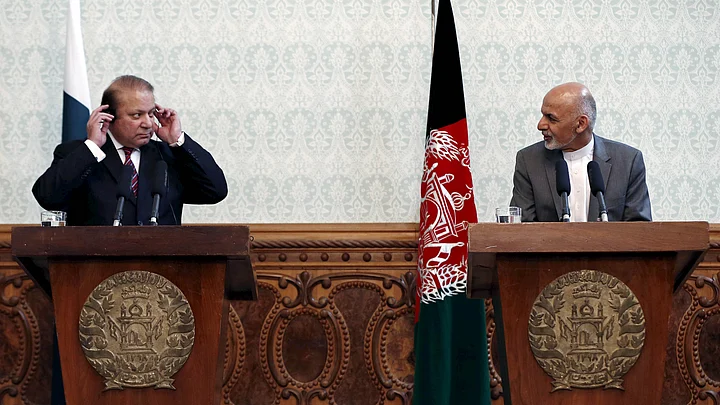President Ashraf Ghani’s May 29 missive to Pakistani Prime Minister Nawaz Sharif, deliberately leaked to international media, warned that Afghan patience was wearing thin.
This, even as the Afghan Taliban spring offensive intensified and Pakistan was seemingly unable to exert adequate pressure on them to hold off.
The ultimatum to otherwise reverse Afghanistan’s diplomatic outreach to Pakistan within three weeks is a sequel to the furore which broke out in sections of Afghan civil society.
It also comes close on the heels of an unprecedented intelligence sharing agreement pencilled between the Inter-Services Intelligence (ISI) and Afghan Amniat or National Defence for Security (NDS) during Nawaz Sharif and COAS General Raheel Sharif’s visit to Kabul on May 12.
An Unprecedented Af-Pak Agreement
Even as the NDS apprehended a truck with 16 tons of explosives sent by the Haqqani network on the Pak-Afghan border, public demonstrations broke out in Kapisa against the accord.
Former Amniat chief Amrullah Saleh decried doubting Pakistan’s ‘duplicity in terror’ and dishonouring of Afghan national security force sacrifices.
As tweeted by Maj Gen Asim Bajwa, Pakistan’s Director General of Inter Services Public Relations (ISPR) on May 17, the accord would provide for ‘intelligence sharing’ as well as ‘complimentary and co-ordinated operations’. The Pakistanis claimed to have offered to train Afghan intelligence officials as well, which has been denied rather contemptuously by the Afghans.
In common parlance, the agreement would involve sharing of information by the Afghans to help nab or decapitate Mullah Fazlullah, head of the Tehrik-e-Taliban, Pakistan (TTP), who continues to attack Pakistani military and Frontier Corps troops with impunity from his safe havens across Tirah valley, in Paktia, and Nangarhar inside Afghanistan.
Afghans Angling for a Swap
The Afghans, who have already handed over Latif Afridi, the apprehended interlocutor of the Haqqani network to the Pakistanis under American pressure, have been seeking a swap of high value Afghan Taliban ‘prisoners’ from the Pakistani side, notably Mullah Biradar.
Ghani’s letter now strongly urges Pakistan to dismantle Haqqani network and Taliban safe havens in Quetta and Peshawar more effectively, so that the nascent or evolving peace/reconciliation process can be seen to be paying dividends.
A Revival of the Peace Process
The Qatar peace process was revived with a meeting on May 3 at the spa resort of al-Khor. The Taliban was represented by Mullah Sher Muhammed Stanekzai while the Hizb-e-Islami (Hikmatyar)’s Ghairat Baheer attended.
From the Afghan government side, apart from Ashraf Ghani’s uncle Qayyum Kuchai, a large delegation including Anwar-ul-Haq Ahadi, Syed Ishaq Gailani, Shahzada Shahid, Fahim Hakim, Ataullah Ludin, Wahidullah Shahrani was present.
These were Pashtuns but no one from the ‘Kandahar group’ was represented. The only woman delegate was MP Malalai Shinwari. The Taliban’s al Khor statement stressed their known pre-conditions, seen as the main hurdles to peace. These included reiterating demands for complete foreign force withdrawal, removal of names from blacklists and release of prisoners.
Interestingly, certain consensus points seemed to be evolving – both sides lamented civilian casualties and expressed concern on corruption in administration and the need to eradicate the drugs economy.
There is grudging Taliban accommodation of women’s rights. Gaps remain though, on what would constitute a truly ‘Islamic’ government or ‘Islamic Constitution’.
A Round of Secret Talks
Another round of secret talks was held in Urumqi, China, on May 19-20, this time under the initiative of Pugwash Secretary General, Paulo Cotta Ramusino, with Chinese and Pakistani ISI officials overseeing the process.
The Quetta Shoora sent three senior Taliban leaders close to Mullah Omar – namely Mullah Hassan Rahmani, Maulvi Jalil and Mullah Abdul Razzaq.
The Ghani government was represented by High Peace Council member, Masoom Stanekzai, now nominated as Afghanistan’s new defence minister.
Not much is known so far of any concrete progress there though the Taliban are believed to have asked for direct access to the Chinese leadership. Paulo Ramusino has been following up on these negotiations in Kabul from May 30. A second preparatory round of talks is scheduled in Dubai on June 6 before another Qatar round, slated for July 17.
Ghani’s letter to the Pakistanis threatens to put a spanner in the works unless the latter deliver, pressurising the Taliban to ease off on their attacks on Afghan security forces in Kunduz, Daikundi and Farah, all new areas of offensive in the north and west, apart from persisting battles in Helmand.
Reconciliation at the Head of Pak-Afghan Bonhomie?
Meanwhile, in a reflection perhaps of responding American pressure and rejecting one of Taliban’s demands, the Qatar government has extended the travel ban on the released ‘Guantanamo five’ – Mullah Khairkhowa, Noorullah Noori, Abdul Haq Wasiq, Fazil Mazloom and Mohd Nabi Omari.
These developments only confirm that reconciliation would remain a tortuous process with many unexpected twists and turns, which could see the new-found Pak-Afghan bonhomie unravel.
India needs to patiently wait and closely monitor these events while honing its own options to remain relevant.
